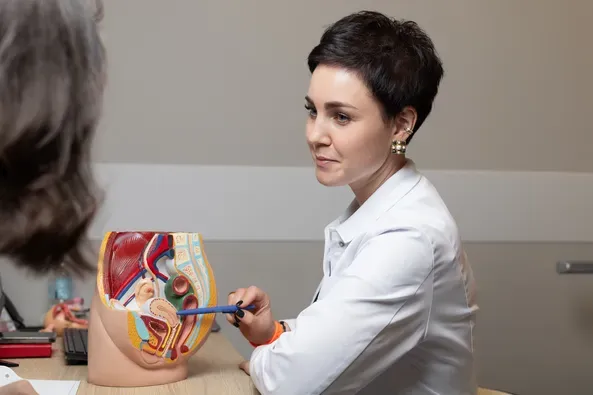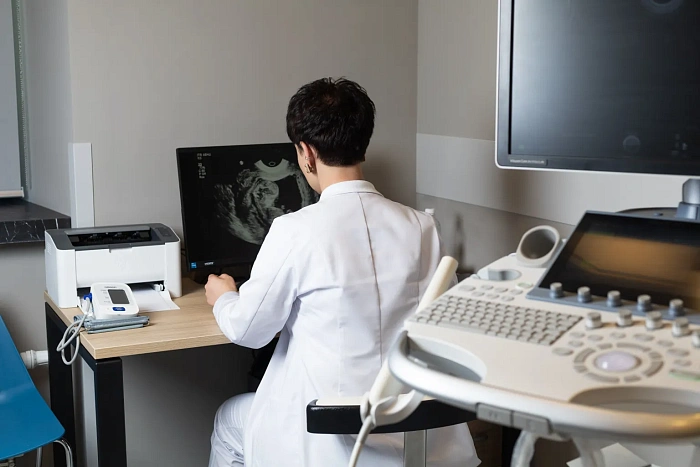Consultation of a gynecologist
Medical examination aimed at diagnosing, treating and preventing diseases of the female reproductive system.

It is important to consult a gynecologist for a variety of health concerns, including infections, inflammation, and cancers. A gynecologist can also help with menstrual issues and fertility problems.
We recommend seeing a gynecologist for checkups at least once a year, even if you don't have any symptoms or diseases. A gynecologist will examine you and answer any questions you have about women's health. This includes help choosing a type of birth control and referrals to other specialists if needed.
Before you see a gynecologist, collect the results of your past tests and examinations. Make a list of your medications and supplements. Write down your symptoms and when they started. Include the date of your last period. It is also important to provide information about chronic diseases and allergies.
The consultation begins with a thorough review of your medical history and list of current symptoms. This is followed by an examination on a gynecological chair to check the health of your vagina and cervix. They may do a Pap test, a test for human papillomavirus, tests to check the vaginal microflora, or an ultrasound of the pelvis. Some cases may require additional blood and urine tests. At the end of the appointment, the gynecologist will discuss the results, provide recommendations, and prescribe treatment, if necessary.
The gynecologist uses instruments for examination, an ultrasound machine to look at the pelvic organs, and a colposcope to closely examine the cervix. The examination is performed on a gynecological chair.
When you get test results, wait for further instructions. Make a follow-up appointment as needed to discuss your next steps. Going to your gynecologist regularly will help you stay healthy and spot any changes early on.
Benefits
Advanced methods
We use the latest diagnostic and treatment methods to ensure the best results.
Highly qualified specialists
Gynecologic consultations are conducted by experienced professionals who have helped hundreds of patients.
Personal approach
Treatment and prevention plans are developed based on each patient's health specifics.
Precise diagnostics
Gynecologist consultation helps identify the causes of gynecologic symptoms and make an accurate diagnosis.
In what cases is it necessary to see a doctor?
Pain in the lower abdomen
Regular or sudden pain in the lower abdomen
Menstrual disorders
Irregular, excessive, or painful menstruation
Unusual discharge
Assessment of the general state of health during pregnancy planning
Pain during sexual intercourse
Discomfort can be a sign of infections, hormonal disorders, or physiological problems.
Preparation for consultation
Before consulting a gynecologist, it is recommended to collect the results of previous studies and tests, prepare a list of medications and supplements, record the symptoms with their duration, and mark the date of the last menstruation. It is also important to inform the doctor about chronic diseases and allergies.

Consultation
During the consultation, the doctor collects an anamnesis, clarifies the patient's complaints and symptoms. Then he performs an examination on a gynecological chair to assess the condition of the vagina and cervix. The doctor can take a smear for cytological examination (PAP test), a smear for human papillomavirus, swabs to assess the state of the vaginal microflora, and also perform an ultrasound examination of the pelvic organs. If necessary, additional blood and urine tests are prescribed. At the end of the consultation, the doctor discusses the results of the examination, makes recommendations and, if necessary, prescribes treatment.

Recommendations
If tests have been taken, wait for their results and, if necessary, make an appointment again to discuss further steps. Regular visits to the gynecologist will help maintain health and detect any changes in a timely manner.

Frequently Asked Questions
How long does a gynecologist consultation last?
Do I need any other tests before the appointment?
Didn't find an answer to your question?
You can describe your problem in detail and ask a question to the doctor. He will answer you and help you find a solution
Врачи
Смотреть всех врачейCandidate of Medical Sciences. Gynecologist-obstetrician. Head of the gynecology department.
Gynecologist-obstetrician, Gynecologist-endocrinologist, Pediatric Gynecologist, Ultrasound specialist.
Indications and contraindications
Indications
Planned gynecological examination
scheduled inspection at least once every 6-8 months
Violation of the menstrual cycle
Changing the functioning of the organs of the reproductive system
Change of external genitalia
Changing structure, coarsening and skin deformation
Pain and discomfort in the intimate area
the occurrence of unpleasant sensations that are accompanied by itching, burning and smell
Problems with urination
the appearance of constant urination
Gynecological diseases
pain, discomfort in the genitals
Expected effect
Treatment of existing conditions
Effective treatment of detected gynecological problems.
Maintaining reproductive health
Measures to improve the general condition of the reproductive system.
Early diagnosis
Detection and prevention of diseases at an early stage.
Prevention
Recommendations for the prevention of women's health problems.
Similar referral activities
Removal of tumors in the intimate area
A procedure aimed at eliminating benign growths such as papillomas, warts, cysts and genital warts.
Colposcopy procedure
A procedure in which a doctor can use a colposcope to examine the vagina, cervix and vulva, examine the mucous membrane in detail and identify abnormal changes that may be a sign of diseases.
Cervical plastic surgery
Cervical plastic surgery (tracheloplasty) is a surgical restoration of the anatomical structure and function of the cervix, which helps to maintain the health of the reproductive system.
Treatment of vulvar diseases
Vulvar diseases, including chronic fissures, sclerotrophic lichen and other dermatological conditions. We offer modern and effective treatment methods aimed at reducing symptoms and restoring the normal condition of the vulva skin.
Correction of menopause problems
The onset of menopause is often accompanied by a number of physical and mental manifestations unpleasant for a woman. The gynecologist will choose therapy, which can relieve or completely eliminate the symptoms.
PRP-therapy with plasma in gynecology
Plasma therapy helps to eliminate dryness, atrophy of the vaginal mucosa by activating cell regeneration, collagen synthesis, and attraction of intercellular fluid.

